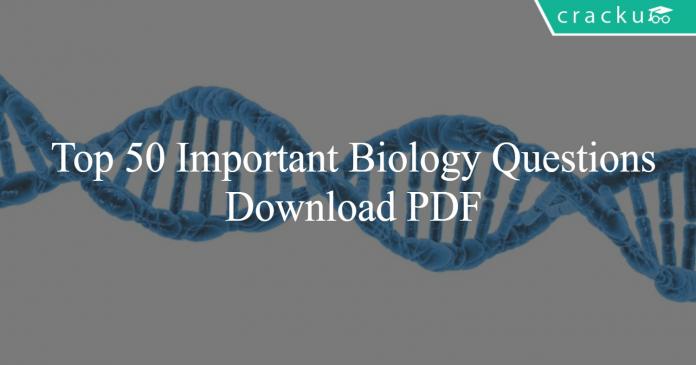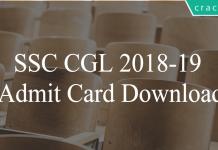Top 50 Important Biology Questions for SSC Exams (CGL, CHSL, JE, CPO, MTS, GD, Steno)
Download SSC Biology questions with answers PDF based on previous papers very useful for SSC CGL, CHSL, JE, Stenographer, MTS, CPO, JE, GD exams. 50 Very important Biology objective questions (MCQ’s) for SSC exams.
Download Top 50 SSC Biology Questions PDF
25 SSC CGL Mocks – Just Rs. 149
Question 1: The terminal part of the carpel in a flower, which may be sticky is ______.
a) Ovary
b) Style
c) Stigma
d) Anther
Question 2: – The rhythmic contraction of the lining of muscles of canal to push the food along the gut is called ______.
a) peristalsis
b) facilitation
c) guttation
d) No option is correct.
Question 3: Which is the muscular tissue i.e, multinucleated?
a) Smooth muscle
b) Cardiac muscle
c) Skeletal muscle
d) Unstriated muscle
Question 4: The voluntary muscles are also called ______ muscles.
a) Skeletal
b) Smooth
c) Cardiac
d) Unstriaated
Question 5: Which enzyme is present in all members of the animal kingdom except Protozoa?
a) Insulin
b) Pepsin
c) Renin
d) Amylase
SSC CGL Previous Papers Download PDF
SSC CHSL PREVIOUS PAPERS DOWNLOAD
Question 6: Leptospirosis is a disease caused by
a) Virus
b) Fungus
c) Protozoa
d) Bacteria
Question 7: Which substance is predominantly found in urine?
a) Blood proteins
b) creatinine
c) red blood cells
d) white blood cells
Question 8: The animals in which the body cavity is absent are known as __________.
a) Coelomates
b) Wild
c) Pseudocoelomates
d) Acoelomates
Question 9: Based on the common features like presence of notochord and dorsal hollow neural system, animals like fishes, amphibians, reptiles, birds along with mammals are included in which Phylum?
a) Mammalia
b) Chordata
c) Primata
d) Insecta
Question 10: In animals like Annelids, Molluscs, organs have associated to form functional systems, each system concerned with a specific physiological function. This pattern is called which system level of organization ?
a) organ
b) open
c) closed
d) coelom
18000+ Questions – Free SSC Study Material
Question 11: Which is an example of Mollusca Phylum?
a) Locust
b) Butterfly
c) Scorpion
d) Octopus
Question 12: In roots, the protoxylem lies towards periphery and metaxylem lies towards the centre. Such arrangement of primary xylem is called ____________.
a) Xylem fibres
b) Xylem parenchyma
c) Exarch
d) Endarch
Question 13: Alveoli is related to which system of human body?
a) Circulatory system
b) Excretory system
c) Reproductive system
d) Respiratory system
Question 14: What is the role of Pneumatophores?
a) Protect plant from animals
b) Get oxygen for respiration
c) Supports plant in standing upright
d) Helps plant for pollination
Question 15: Plant tissues are of how many types?
a) 3
b) 2
c) 5
d) 6
Question 16: Auxiliary bud develops into which part of the plant?
a) Fruit
b) Leaf
c) Branch
d) Roots
Question 17: Bacteria was discovered by
a) Antonie van Leeuwenhoek
b) Belarus
c) Hugo de Vries
d) Robert Brown
Question 18: Workers in leather tanning industries tend to suffer from
a) asthma
b) heart diseases
c) skin diseases
d) blood diseases
Question 19: Myopia is a defect of eyes which is also known as
a) Far Sightedness
b) Near Sightedness
c) Astigmatism
d) Night Blindness
Question 20: Which plants have root nodules?
a) Leguminous plants
b) Parasitic plants
c) Epiphytic Plants
d) Aquatic Plants
Question 21: ………………….is a multibranched polysaccharide of glucose that serves as a form of energy storage in animals and fungi.
a) Cellulose
b) Glycogen
c) Pectin
d) Chitin
Question 22: Mesothelioma is a type of cancer. The most common area affected in it is the lining of the ……………
a) heart
b) brain
c) stomach
d) lungs
Question 23: Binomial Nomenclature was founded by
a) Charles Darwin
b) Robert Nucleus
c) Carl Linnaeus
d) Lamarck
Question 24: Name the respiratory organs of insects
a) Skin
b) Body Surface
c) Gills
d) Tracheae
Question 25: Which drug is used as an Antidepressant?
a) Oxybutynin
b) Tramadol
c) Sumatriptan
d) Bupropion
1500+ Free SSC Questions & Answers
Question 26: Which part of the brain is responsible for triggering actions like thinking, intelligence, memory and ability to learn?
a) Diencephalon
b) Hypothalamus
c) Cerebrum
d) Control
Question 27: Photosynthesis takes place inside plant cells in …………….
a) Ribosomes
b) Chloroplasts
c) Nucleus
d) Mitochondria
Question 28: The primary function of RNA is
a) Photosynthesis
b) Protein Synthesis
c) Replication
d) Translation
100+ Free GK Tests for SSC Exams
Question 29: Haemoglobin has the highest affinity with which gas?
a) SO2
b) CO2
c) CO
d) NO2
Question 30: Which juice is secreted by the liver?
a) Glucose
b) Iodine
c) Cortisol
d) Bile
Question 31: The wilting of plants takes place due to _____.
a) Photosynthesis
b) Transpiration
c) Absorption
d) Respiration
Question 32: The yellow colour of human urine is due to
a) Bile Salts
b) Cholesterol
c) Lymph
d) Urochrome
Question 33: Which is the largest part of the human brain?
a) Ribs
b) Cerebrum
c) Pons
d) Thalamus
Question 34: Which cells give rise to various organs of the plant and keep the plant growing?
a) Permanent
b) Dermal
c) Meristematic
d) Mature
Question 35: Contraction of heart is also known as
a) Systole
b) Aristotle
c) Diastole
d) Lub
Question 36: Prothrombin, responsible for clotting of blood is released by………………
a) Small Intestine
b) Blood Platelets
c) Large Intestine
d) Heart
Question 37: Which organisms does not fit into the Cell Theory?
a) Bacteria
b) Virus
c) Fungi
d) Plants
Question 38: Achras sapota is the scientific name of
a) Custard Apple
b) Gulmohar
c) Tamarind
d) Chiku
Question 39: The later (second) formed primary xylem elements are called _____________.
a) Protoxylem
b) Metaxylem
c) Xylem parenchyma
d) Xylem fibres
Question 40: In the names Mangifera indica (mango), Solanum tuberosum (potato) and Panthera leo (lion), what does the three names, indica, tuberosum and leo, represent?
a) Binomial Nomenclature
b) Taxonomic Hierarchy
c) Identification
d) Specific Epithet
Question 41: What is plant cell wall mainly composed of?
a) Lipids
b) Vitamin
c) Cellulose
d) Protein
15000 Questions – Free SSC Study Material
Question 42: How many pairs of ribs are there in human body?
a) 13
b) 11
c) 12
d) 14
Question 43: Vitamin A is also known as ………….
a) Thiamine
b) Riboflavin
c) Retinol
d) Calciferol
Question 44: Which organ is also known as the Biochemical Laboratory of the Human Body?
a) Small Intestine
b) Brain
c) Pancreas
d) Liver
Question 45: Sugarcane is a type of ………….
a) creeper
b) tree
c) shrub
d) grass
Question 46: Which is the second largest animal phylum?
a) Mollusca
b) Chordata
c) Coelomates
d) Anneldia
Question 47: Which is a structural and functional unit of kidneys?
a) Renette Cells
b) Flame Cells
c) Nephrites
d) Nephrons
Question 48: Intestinal bacteria synthesizes which vitamin in the human body?
a) Vitamin K
b) Proteins
c) Fats
d) Vitamin D
Question 49: What is an excretory organ of cockroach?
a) Malphigian Tubules
b) Nephridia
c) Coxal Gland
d) Green Gland
Question 50: Sycon (Scypha), Spongilla (Fresh water sponge) and Euspongia (Bath sponge) are examples of which Phylum?
a) Coelenterata
b) Platyhelminthes
c) Ctenophora
d) Porifera
Download Current Affairs Questions & Answers PDF
Answers & Solutions:
1) Answer (C)
2) Answer (A)
3) Answer (C)
4) Answer (A)
5) Answer (D)
6) Answer (D)
7) Answer (B)
8) Answer (D)
9) Answer (B)
10) Answer (A)
11) Answer (D)
12) Answer (C)
13) Answer (D)
14) Answer (B)
15) Answer (A)
16) Answer (C)
17) Answer (A)
18) Answer (C)
19) Answer (B)
20) Answer (A)
21) Answer (B)
22) Answer (D)
23) Answer (C)
24) Answer (D)
25) Answer (D)
26) Answer (C)
27) Answer (B)
28) Answer (B)
29) Answer (C)
30) Answer (D)
31) Answer (B)
32) Answer (D)
33) Answer (B)
34) Answer (C)
35) Answer (A)
36) Answer (B)
37) Answer (B)
38) Answer (D)
39) Answer (B)
40) Answer (D)
41) Answer (C)
A plant cell wall mainly composed of cellulose.
42) Answer (C)
43) Answer (C)
44) Answer (D)
45) Answer (D)
46) Answer (A)
47) Answer (D)
48) Answer (A)
49) Answer (A)
50) Answer (D)
DOWNLOAD APP FOR SSC FREE MOCKS
We hope this Biology questions for SSC Exam will be highly useful for your preparation.





